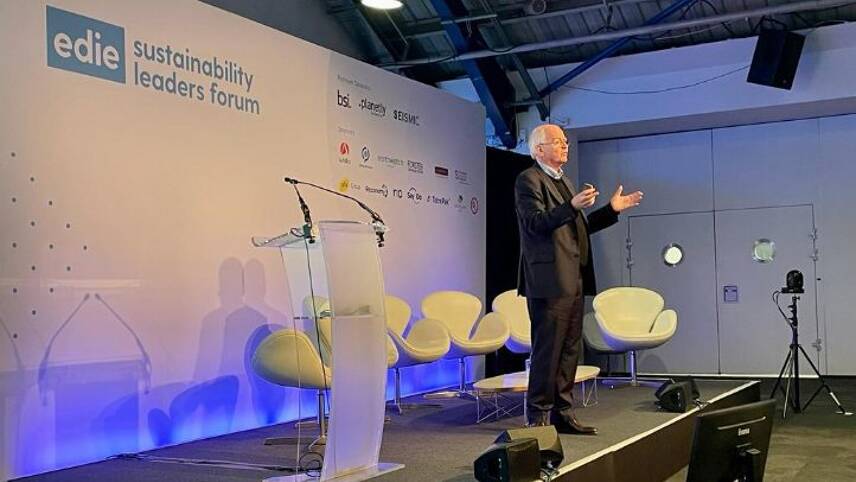Register for free and continue reading
Join our growing army of changemakers and get unlimited access to our premium content

Elkington delivered a rousing speech to more than 350 attendees at London's Business Design Centre
Delivering his keynote speech at edie’s Sustainability Leaders Forum in London this morning (9 March), Elkington said: “I think we’re at a crossroads, now, where some of the things that seemed impossible suddenly become possible.”
He was speaking, directly, about the feeling of watching a global pandemic, a summer of unprecedented extreme weather events, and then a war in Europe, through a mobile phone. But this ability to swiftly make the impossible possible will bring positive outcomes for sustainable development.
“I am immensely excited,” Elkington continued. “I’ve not been as exciting for the potential for change, now, as I have been for 20 to 30 years.”
He outlined how Volans has worked to map “a deep structure of the change agenda” since the start of 2020, explaining how this work has led to a belief that we are now exiting what Volans has dubbed the “Greta Thunberg” wave of environmental pressure.
This wave is defined as the period from 2015 to 2021 (indeed, Thunberg staged her first one-person Fridays for Future strike in 2018) in which “we felt, very strongly, the commitment, the passion, but also the anxiety” of youth climate activists across the world.
The coming wave, Elkington argued, will be about turning passion into action and anxiety into “radical optimism”. He expects the global economy to “rocket” from a CSR-heavy approach, through resilience, and finally to a regenerative state, within 10 to 15 years.
Resilience, at Volans, is defined as a period of massive transition with many cons that are, ultimately, outweighed by pros. Cons include social polarisation, short attention spans and some regions and nations reaching natural resource boundaries. Pros include environmental and social issues rising up the political agenda and the rise of a purpose-led approach to business.
On the other side of resilience is regeneration. Volans lists aspects of a regenerative economy as including an end to fossil fuels; ensuring equal access to health, education and capital; designing out waste and properly pricing externalities.
Elkington summarised: “CSR and the citizenship agenda is now – not waning, because it continues to expand. But it’s gradually being replaced by several other agendas.
“The capitalism we’ve grown up with, particularly as it went into overdrive after 1989, is not working…. It must now not be about just tinkering language, or even with economics. The change will be fundamental this time.”
He pointed to high-level predictions around – and campaigns to deliver – this change, including the Financial Times’ ‘time for a reset’ campaign and the World Economic Forum’s ‘Great Reset’ project. He also pointed to an increasing number of businesses committing to becoming regenerative, from challengers like Patagonia to big incumbents like Walmart and Unilever.
Major disruption
With the room feeling energised, Elkington did have a word of caution. He said that regeneration, as it is often spoken about at businesses in regard to nature “sounds comfy and cosy”. But, he argued, it is “fundamentally political”.
Elkington spoke of how a lot of industries, including those with high involvement in political lobbying and those employing millions worldwide, “are going to go to the wall”. They include fossil fuel production, diesel and petrol vehicle manufacturing and fertilizer.
This point built on a discussion between speakers on Day One of the Forum, in which the need for a “whole planet retrofit” was discussed. Changing economics, politics and technologies will, of course, upset those currently benefiting from the present status quo, which is the result of decades and centuries of capitalism and imperialism. And, in Elkington’s mind, the previous CSR agenda has, in some ways, upheld business-as-usual.
Elkington summarised: “Sustainability, as it has evolved and advanced as an agenda, becomes mainstream and diluted. It’s cosy in that it is whatever the company decides…..Regeneration is not going to be like that.”
Reasons for optimism
As he came to the end of his speech, Elkington was keen not to leave listeners with a negative final note.
He spoke of how progress has always – and will continue to – seemingly happen “gradually, then suddenly”. This has been seen in the falling costs of wind and solar, and, although we’re less of the way along the curve here, growing uptake of electric vehicles.
“I think the fundamental point has to be made – that exponential trends, when they influence our economies and societies, actually start off by doing much less than we had hoped,” he said.
“Also, paradigm shifts take about 70 to 80 years, the real ones. We’re about 65 years into a paradigm shift, which means, to my mind, that in the next 10 to 15 years, we will see a sea change on multiple fronts.
“The odd thing…. Is that every time a wave has built to a peak, something has happened that has broken the curve. The Iraq and Iran war, and before that the OPEC oil shocks. The 2001 attacks on the World Trade Centre. The 2007-8 financial crash.”
The current curve-breaker is, of course, Russia’s war in Ukraine. But, here in the UK specifically, there is also a new wave of disinformation around net-zero and the energy price crisis, which was taken to new heights this week with announcements from Nigel Farage.
Elkington ultimately believes that “radical optimism” is not misplaced in this context. Rather, it is necessary – and it shows a willingness to think beyond the 24-hour news cycle or the traditional business cycle.
He concluded by stating: “Are we ready for what we’re going to be called on to do? If we’re not, the challenge is to either step up or be prepared to get out of the way.”
Sarah George


Please login or Register to leave a comment.